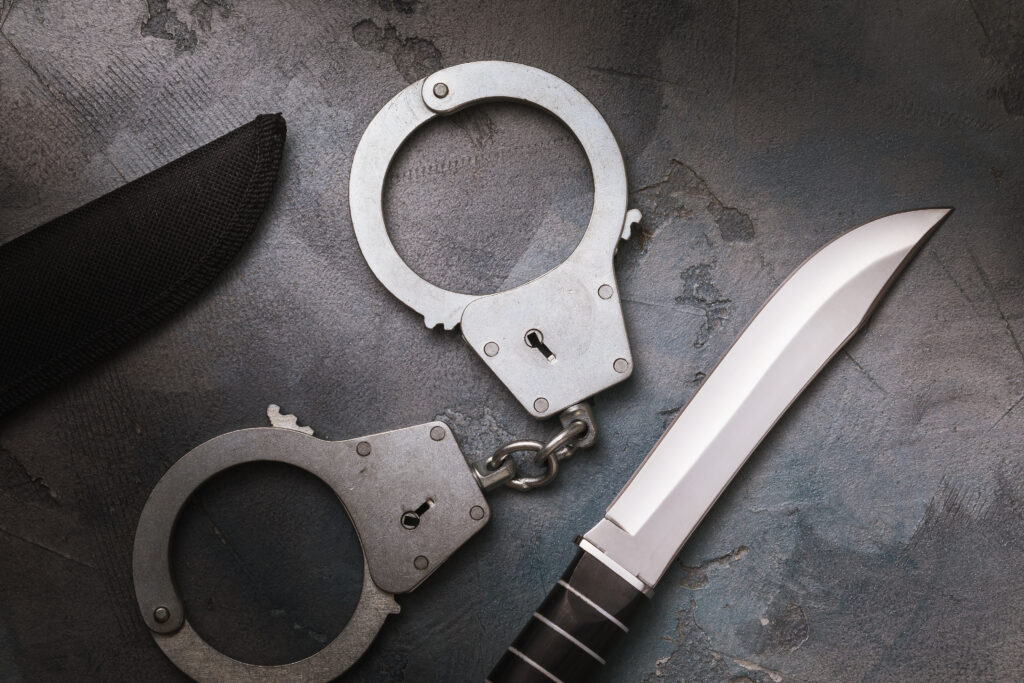Knife charges in Indiana can lead to serious legal consequences, and understanding the laws surrounding these cases is crucial. While the possession and use of knives may seem straightforward, certain situations can escalate into criminal offenses with severe penalties. Depending on the circumstances, charges can range from misdemeanors to felonies, potentially resulting in significant fines, probation, or even jail time. Knowing the stakes involved is the first step toward protecting your rights and future.
At Hayes Law Office, we bring a laser-sharp focus to defending clients against knife-related charges. Our firm is deeply committed to pursuing justice while prioritizing results that safeguard your life and reputation. From analyzing the specifics of your case to developing a strategic defense, we take a proactive approach to ensure you have the strongest possible representation.
If you're facing allegations, whether related to unlawful possession, brandishing, or use of a knife, we are here to provide the skilled legal counsel you need. We take a proactive and strategic approach to every case, analyzing the facts, challenging evidence, and building the strongest defense possible. Your future matters, and we are your hard-hitting local attorneys serving Indiana with strategic criminal defense representation. Contact us today and experience our legal force in action.
Indiana Knife Laws: What You Need to Know
Indiana knife laws outline what is permissible regarding the possession and use of knives, but crossing certain lines can lead to criminal charges. While it is generally legal to own and carry most types of knives in the state, there are important exceptions.
Misdemeanor vs. Felony Knife Charges
The severity of knife-related charges in Indiana depends on the circumstances of the offense. Misdemeanor charges typically apply to lesser offenses, such as carrying a knife in a prohibited area or a first-time offense without aggravating factors. Penalties may include fines, probation, or short-term imprisonment.
Whereas felony charges usually apply to more severe cases, such as using a knife to commit a violent crime or possession by a prohibited person (e.g., someone with a prior conviction). Felonies carry harsher consequences, including longer prison sentences and significant fines.
Having a clear understanding of Indiana’s knife laws can help individuals make informed decisions and avoid unintentionally violating the law. If you're involved in a situation involving knife charges, consulting an experienced legal professional is vital to protecting your rights.
When a Knife Becomes a Criminal Offense
Possessing a knife becomes a criminal offense when it is used in a threatening or unlawful manner, such as during an altercation or as a weapon to commit a crime. Schools, government buildings, and other restricted areas also have specific rules prohibiting the possession of knives, and violating these restrictions can result in legal penalties.
Is It Legal to Carry a Knife in Indiana?
Indiana’s knife laws are relatively lenient but still come with key rules that you need to understand. Generally, it is legal to carry most kinds of knives in public, whether openly or concealed. However, certain types, like ballistic knives, may be restricted depending on the circumstances. Locations such as schools, courthouses, and other government buildings often prohibit knives entirely, and carrying one in these areas could lead to legal consequences. Additionally, using a knife unlawfully or to threaten someone in any situation will elevate it from lawful possession to a criminal offense.
Indiana Knife Length Restrictions
A unique aspect of knife laws in Indiana is the absence of formal statewide restrictions on blade length, meaning no specific law outright bans carrying knives of certain lengths. However, local ordinances may impose their own restrictions, so it’s essential to check the regulations in your city or county. To stay compliant and avoid accidental violations, ensure you are carrying a knife responsibly, avoid restricted areas, and understand how your local laws might differ from state regulations. If you are unsure of the specifics regarding knife carry laws in Indiana, consulting with a knowledgeable criminal defense attorney can help clarify your rights and protect you from potential issues.
Concealed Carry Knife Laws in Indiana
Concealed carry knife laws in Indiana are relatively permissive, but there are still important regulations to be aware of. While most knives can be carried concealed without issue, their use or possession becomes illegal in certain scenarios, such as on school grounds or in areas specifically restricted by local ordinances. Using a concealed knife to threaten or harm someone can elevate the situation to a criminal offense, potentially resulting in serious legal consequences. Understanding where and how you can carry a knife is crucial to staying within the law.
What Knives are Illegal in Indiana?
When it comes to specific knife types, Indiana has some distinctions you’ll want to note:
- Switchblades: Legal to possess and carry, as Indiana does not outright prohibit them.
- Butterfly knives: Also legal for open or concealed carry under state law.
- Automatic knives: Allowed, but improper use or carrying them in restricted areas could result in charges.
- Knives with ballistic capabilities (e.g., blades that detach and shoot out): Regulated more strictly and may lead to legal issues.
Every case involving knife possession or concealed carry is unique due to the circumstances, local laws, and intended use of the knife. If you’re facing potential charges or have questions about knife laws in Indiana, consulting with an experienced criminal defense attorney is the best way to protect your rights and ensure you receive accurate legal guidance tailored to your situation.
Knife Charges and Criminal Penalties in Indiana
Knife charges in Indiana can carry significant consequences, impacting both your immediate circumstances and long-term future. The penalties for knife-related offenses often depend on the specifics of the case, such as the type of knife involved, how it was used, and any prior criminal history. Individuals convicted of these charges may face hefty fines, jail time, or even a permanent mark on their criminal record, which can limit job opportunities, housing options, and reputation.
Knife Crime Penalties: Jail Time and Fines
The penalties for knife-related crimes in Indiana vary based on the severity of the offense. Here are some examples of what individuals might face:
-
Misdemeanor charges: Up to one year in jail and fines of up to $5,000. These can result from first-time offenses or minor violations, such as carrying a knife in a restricted area.
-
Felony charges: Penalties range from one year to six or more years in prison and fines of up to $10,000. These typically apply to more serious cases, such as using a knife in the commission of a violent crime.
Knife-related charges can disrupt every aspect of a person’s life, creating financial strain and long-term barriers to achieving personal and professional goals. Having an experienced criminal defense attorney can make all the difference, helping you build a strong case and work toward minimizing the impact of these allegations.
Can Minors Be Charged for Knife Possession?
For minors, the consequences can be significant, as they may face charges for possessing a knife, particularly in restricted areas such as schools or if the knife is used in a threatening way. Juvenile charges can lead to outcomes like probation, mandatory counseling, or even placement in a detention facility. Addressing these situations promptly and with the guidance of legal counsel is crucial. Depending on the severity of the case, minors caught with a knife in restricted areas or using it unlawfully may be subject to court-ordered probation, community service, or confinement in a juvenile detention center.
Common Defenses Against Knife Charges
If you or a loved one is facing knife charges in Indiana, it’s crucial to approach the situation with a clear strategy and professional support. Knife-related charges can lead to severe consequences, including jail time, fines, and a lasting impact on your future, which is why having an experienced criminal defense attorney is invaluable. A skilled attorney thoroughly investigates the circumstances of your case, reviews the evidence, and develops a personalized defense strategy to protect your rights and minimize the potential penalties. Acting quickly is essential to ensure your case has the strongest possible defense.
There are several common defense strategies that attorneys often employ to counter knife charges effectively, such as:
- Unlawful search and seizure: Challenging evidence obtained without proper legal procedures.
- Lack of criminal intent: Demonstrating that there was no intention to harm or violate the law.
- Self-defense: Arguing that the knife was used to protect oneself from imminent harm.
- Mistaken identity: Establishing that the individual charged was not involved in the alleged incident.
- Improper classification: Disputing the characterization of the knife as an illegal weapon.
At Hayes Law Office, we are deeply committed to helping clients facing knife crime allegations in Indiana. By combining our pursuit of justice with a results-driven approach, we provide the advocacy you need to safeguard your rights and future. Whether you’re navigating complex evidence or confronting aggressive prosecution, we stand ready to guide you every step of the way. Contact Hayes Law Office today to learn how we can help with your case.
What to Do If You’re Facing Knife Charges in Indiana
If you’re facing knife-related charges in Indiana, the best course of action is to consult with an experienced criminal defense attorney. A knowledgeable knife crimes lawyer can help you understand your rights, build a strong defense, and work to minimize the impact of the charges on your future. Hayes Law Office is ready to provide the legal guidance and representation you need. Contact our team today for support.
How Hayes Law Office Helps With Knife Crime Defense
When it comes to knife crime defense, Hayes Law Office is a firm you can trust to fiercely protect your rights and fight for your future. Our dedication to pursuing justice is matched only by our commitment to delivering results. With a hard-earned reputation for success and a battle-ready approach to the courtroom, Hayes Law Office provides clients with the skilled representation needed to tackle even the most complex legal challenges. Contact us today to discuss your case and take the first step toward safeguarding your rights and future. With Hayes Law Office, you gain a trusted ally ready to fight for the best possible outcome.
Knife Charges FAQs
Are pocket knives legal in Indiana?
Yes, pocket knives are legal to own and carry in Indiana. There are no specific restrictions on the everyday carrying of pocket knives unless they are used inappropriately, such as in a threatening manner or to commit a crime. However, you should be cautious about carrying a pocket knife in restricted areas, like schools or government buildings.
Can I carry a knife for self-defense in Indiana?
It is generally legal to carry a knife for self-defense in Indiana, as long as its possession doesn’t violate any local or state restrictions. However, if the knife is used or brandished unlawfully in a threatening or harmful way, this could result in criminal charges. Always ensure your actions fall within the legal boundaries of self-defense.
What happens if I bring a knife to school in Indiana?
Bringing a knife to any school in Indiana is strictly prohibited. This applies to students, staff, and visitors. Violating this law can result in serious legal consequences, including criminal charges. For minors, these charges could lead to probation or detention, depending on the severity of the situation.
Can I carry a knife in my car in Indiana?
Yes, you can carry a knife in your car in Indiana, provided that it is not illegal by type (such as certain ballistic knives) or being transported in violation of local laws. If the knife is used or displayed unlawfully, such as during a road rage incident, it could lead to criminal charges.



